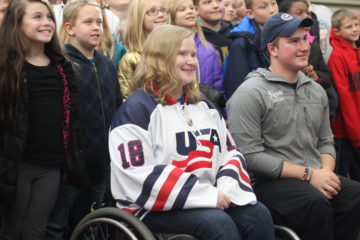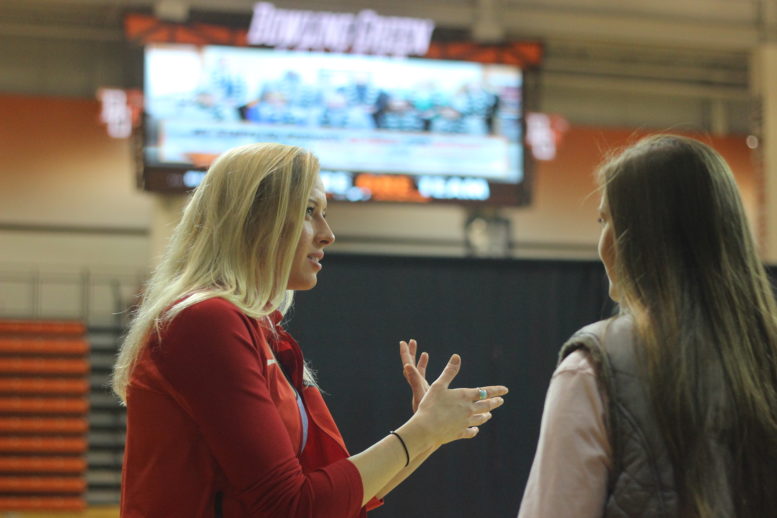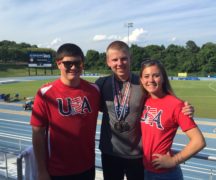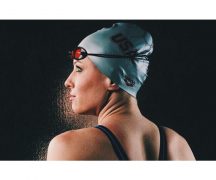By DAVID DUPONT
BG Independent News
Shoe shopping can be a problem when you don’t have any feet.
Double amputee Jessica Long said she dreaded trips to the shoe store because of it reminded her she didn’t have legs. The way the clerk would look at her and her prosthetic legs and feet made her feel disabled. She just wanted shoes that were comfortable and cute.
Long wondered if she’d ever be able to wear high heels or flip flops.

Jessica Long talks to fourth graders at Wood County District Public Library.
Now at 25 new developments mean she can wear flip flops and has high heel prosthetics. She considers her prosthetic legs as “really tall shoes.” She loves to show her legs.
And, along the way, she’s won 25 medals, 13 of them gold (the only ones she counts,) at the Paralympic Games.
Long, the second most decorated Paralympic athlete, was in Bowling Green this week, as the special guest of We Are One Team Bowling Green. She met with athletes on the Bowling Green State University campus, addressed a crowd of 500 in the Stroh Center Wednesday night, and talked to fourth graders from Crim and Conneaut at the Wood County Library on Thursday morning.
As WA1T president and founder Yannick Kluch said at both events, the organization was created to promote diversity and social justice through sports.
Long’s mission is to encourage everyone, regardless of their situation, to strive to excel and persevere.
“I believe the only disability in life is a negative attitude,” she told both crowds.
Long was born in Siberia with deformed lower legs, caused by fibular hemimelia, to a 16-year-old mother. Her birth mother realized she did not have the resources to raise a disabled child. “She made one of the toughest decisions a mother could make to put me up for adoption, hoping I would be adopted by a good family,” Long said at the Stroh Center.
Long’s American parents adopted her when she was 13 months old. Then “they made the difficult decision to amputate both of my legs when I was 18 months old so I could be fitted prosthetic legs and learn to walk. … I truly think they made the best decision.” It was the first of 20 surgeries, she’d undergo as she grew.
She hated the recoveries. “I didn’t understand why it was happening to me.” She just had let her body heal.
And for someone with as much energy as she had that was hard. She did cartwheels and flips, and her parents have told her she once scaled the refrigerator.
Looking for some way to channel that energy into sport, they enrolled her in gymnastics when she was 4. But they were concerned the toll landing was taking on her knees. So at 10 she switched to swimming. She’d already been swimming for years in her grandparents’ pool. “I used to pretend I was a mermaid,” she said.
Long was signed up on a team, and she loved it. She loved the idea of racing and beating girls with legs. “My team always treated me like a friend, a competitor,” she said.
“Every time I jump in the pool, it’s this world of infinite possibilities. I’m completely free. My body takes over. There’s nothing holding me back but myself.”
It was at a meet she learned about the Paralympics, which means “parallel to the Olympics.”
At 12, she went to the qualifying meet to make Team USA. Her parents tried to temper her expectations. Instead of aiming for the 2004 Olympics in Athens, she should aim for 2008, they told her.
But 2004 was her goal. At the end of the qualifying round, “I knew I had done my best. … I knew I could do the impossible if I just believed in myself.” She made the team.
Then her mission was to win a gold medal. Given the low expectations for a 12-year-old ranked 10th in the world, she felt little pressure.
That didn’t mean she took it easy. In the 100 meter freestyle, her first event, she was in fifth place halfway through the race. Not where she wanted to be if she wanted gold. “I swam and swam as fast as I could. … I remember saying to myself ‘I did not come here to get second.’” She won by “a fingernail.”
More medals would follow in Athens, then in Beijing in 2008, London in 2012, and Rio in 2016. She said she’ll compete in 2020 Games in Tokyo, but expects she’ll retired after that.
Now she started to show her legs more, started wearing shorts. Coming from the games where others were missing arms and legs, she was no longer bothered by her missing limbs. The deck on the pool at the games, she said, was a clutter of prosthetic arms, legs, and wheelchairs.
The 2012 Games were memorable for more than the medals. A journalist had been in contact with a Russian couple who said they were her parents. With the assistance of NBC, which recorded her reunion, she was in her birth mother’s arms after 22 years.
Long said all she wanted to tell her was: “I wasn’t angry or upset. … What she did was really, really brave.”
Long made it clear to the BGSU audience that her life journey has not always been easy. The biggest obstacle was inside of her. “I have continuously struggled with acceptance and understanding. But what I realized is, it all boils down to how I view myself and my situation, my perspective. I am in control of how I see myself and my so-called disability.”
She said she also controls how others view her. “As a little girl I felt very insecure that I didn’t have my legs, and it bothered me immensely when people stared. It made me feel there was something wrong with me. It bothered me immensely.”
It took her years, she said, to realize that her attitude about herself shaped the attitudes of others. If she felt sorry for herself, she was giving others permission to feel sorry for her.
On Thursday morning, Long shared that same message and encouraged the fourth graders, kids the same age as she was when she started competing. “You can do anything you want,” she said. “The days you feel like giving up are the days you just have to work harder.”
They would be able to read her story when her book “Unsinkable” written with her younger sister Hannah comes out next year.
The assembly was also attended by three other special guests, adaptive athletes Abby Gase, 15, Eric Rine, 17, and

Adaptive athletes Kelli Anne Stallkamp and Eric Rine attended Jessica Long’s visit to the Wood County District Public Library.
Kelli Anne Stallkamp, 17. They are, Library Director Michael Penrod said, “emerging Paralympians.”
Long’s message resonated with them. Stallkamp, who competes in a number of sports but specializes in Sled Hockey, said not giving up is a key.
“You can do anything,” Rine said, “and you can’t let anything stop you.
All have their sights set on Paralympic Games.
Rine who is on the national team hopes to be heading to the World Championships next year. Gase is swimmer who has competed in the World Trials and has talked with Long in the past.
After Long finished her pep talk to the fourth graders, they got a chance to ask questions.
“Did anyone make fun of you?”
“People will say things,” Long responded, “because they don’t understand.”
Another student wanted to know if it was hard to talk about not having legs.
Long said it was better to talk about it because people are just curious.
And the students, who’d seen video of Long to prepare them for the talk, were curious about how her legs worked.
Who was the fastest swimmer she ever swam against?
Michael Phelps, the most decorated Olympian of all time, she said. Long explained that they trained together for three years in Baltimore where they both grew up.
Could she ever beat Michael Phelps? She praised him as the greatest swimmer in the world. But she could never quite say “no.” It seemed like she was reluctant to give up of any challenge.



